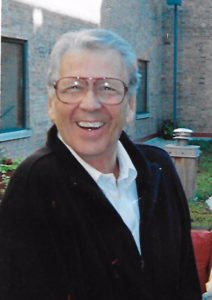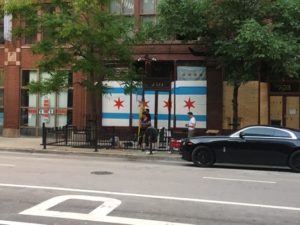Saturdays with Seniors: Bill Gordon’s Picnic
June 20, 2020 • 8 Comments • Posted in careers/jobs for people who are blind, guest blog, memoir writing, teaching memoir, writing prompts
Bill Gordon
I am pleased to feature Bill Gordon as our Saturdays with Seniors guest blogger today. Born and raised in Kansas, Bill lived all over the country during his nearly 50-year career in library and association management. When he retired in 2002, he was the Executive Director of The American Library Association, located here in Chicago, and has called Chicago home ever since.
Nearing his 84th birthday, Bill says life so far has been “a great adventure.” Lucky for us, he enjoys remembering it through his participation in our Monday memoir-writing class.
My flexible assignment “One Crazy Summer” allowed those who needed/wanted to write about the summer ahead of us to do so. Those who preferred escaping to the past could do that, too. Bill often knows exactly what he’ll write about the minute he hears the prompt, and this piece about “Picnic” was no exception.
One Crazy Summer
by Bill Gordon
Rumors were flying that summer. Could it be true? A major studio was going to make a movie in Hutchinson, Kansas?
No one in my circle of friends knew for sure. We did know that William Inge, a Kansas playwright, had won a Pulitzer Prize a year earlier for his play, Picnic. When local newspaper articles started coming out about Inge and his play, we started getting suspicious. Could the movie be Picnic? Maybe the rumors were right, but we still didn’t have any proof.
That summer I was working Monday through Friday as part of the maintenance crew for a local bakery. On Saturdays I delivered flowers for Justice-Mercer Florists, located on Main Street just around the corner from the Baker Hotel, Hutchinson’s newest and tallest building and pride and joy of the Chamber of Commerce. I reported to work early on Saturday to find the other employees in what could only be described as a “dither.” Even the owner, Mr. Shepherd, seemed unable to control his excitement.
“Can y’all work tomorrow,” he asked me. I told him sure, and then I had a question of my own. “But why on Sunday?”
“Several bunches of flowers need deliverin’ to important guests arrivin’ at the Baker Hotel tomorrow,” he said. Before I could say anything, Mr. Shepherd said in an uncharacteristically high squeaky voice, “For the picnickers! Rosalind Russell, William Holden, Kim Novak, Susan Strasberg, Cliff Robertson, Joshua Logan — they’s all stayin’ at the Baker!”
So, it was true! Picnic would be filmed in Hutchinson, Kansas.
When an advertisement for extras and musicians appeared in the local paper, several friends filled out applications for jobs as extras. I applied for a job as a musician. I had been a member of the Musicians Union since I was fourteen. I had performed clarinet solos in practically every church in town, I was a paid member of the Municipal Band, I had been a substitute clarinetist for the Wichita Symphony for three concerts, and I had won several awards in contests supported by the State of Kansas.
I thought I had a competitive performance record.
I auditioned for the combo that would be playing Moonglow in the scene where Madge and Hal (Kim Novak and William Holden) dance provocatively at the Labor Day picnic celebration.
The audition was difficult. I had to play the same things over and over as they tested my tone and technique. The audition team seemed unimpressed, but a week later they called me back and tested me again, putting me through new musical exercises.
Much to my delight and surprise, I was hired. We rehearsed relentlessly to blend together as a musical unit and to be perfect for the Moonglow scene. The scene took eighteen takes — one week’s work, $30 an hour for rehearsals, $50 an hour for performing. Remember, this was the 1950’s. I made more money that week than I did all summer from my other jobs combined. The experience also gave me a fresh perspective on the less than glamorous lives of movie stars and the tedious business of movie making.
But it was a summer to remember.





